外研版(2019)必修三Unit 1-Knowing me,knowing you单元核心考点解析&随堂专练学案(含答案)-Section C
文档属性
| 名称 | 外研版(2019)必修三Unit 1-Knowing me,knowing you单元核心考点解析&随堂专练学案(含答案)-Section C | 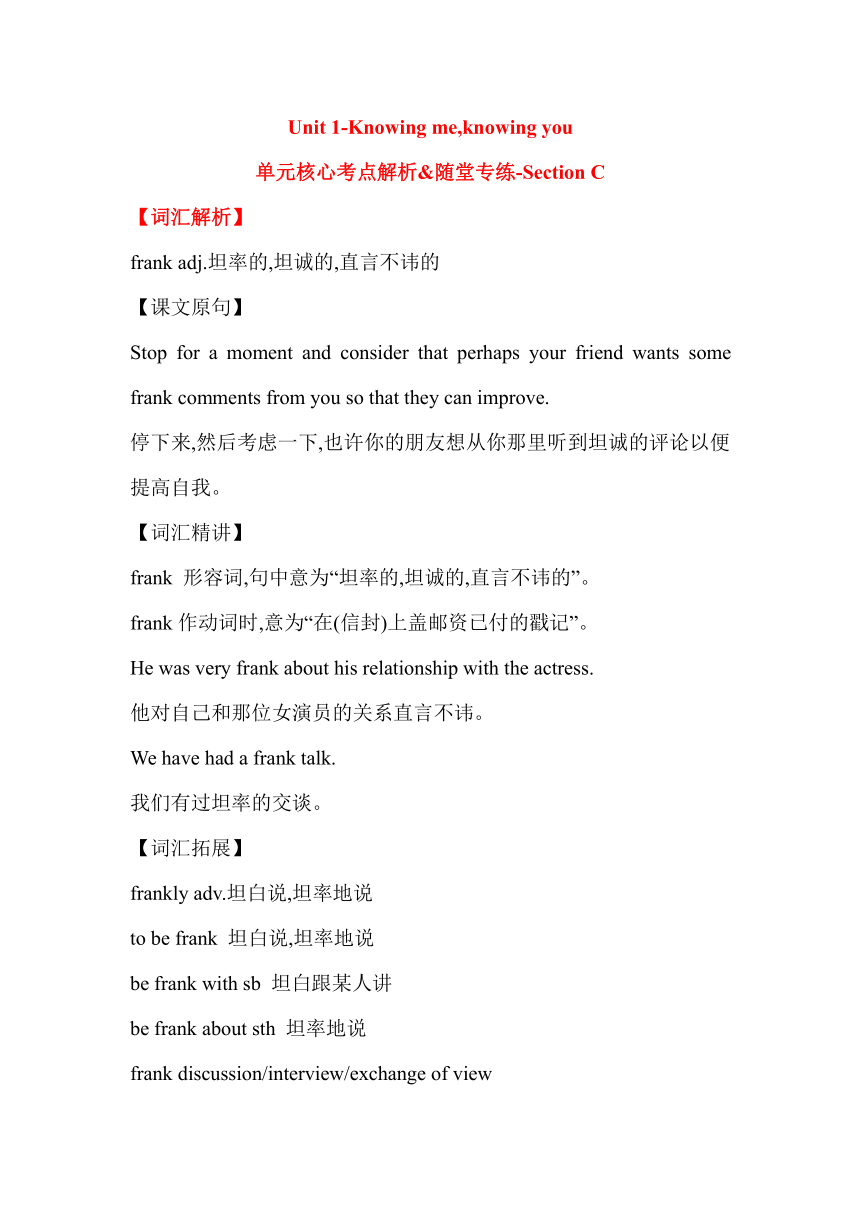 | |
| 格式 | doc | ||
| 文件大小 | 155.5KB | ||
| 资源类型 | 教案 | ||
| 版本资源 | 外研版(2019) | ||
| 科目 | 英语 | ||
| 更新时间 | 2021-06-01 11:10:58 | ||
图片预览

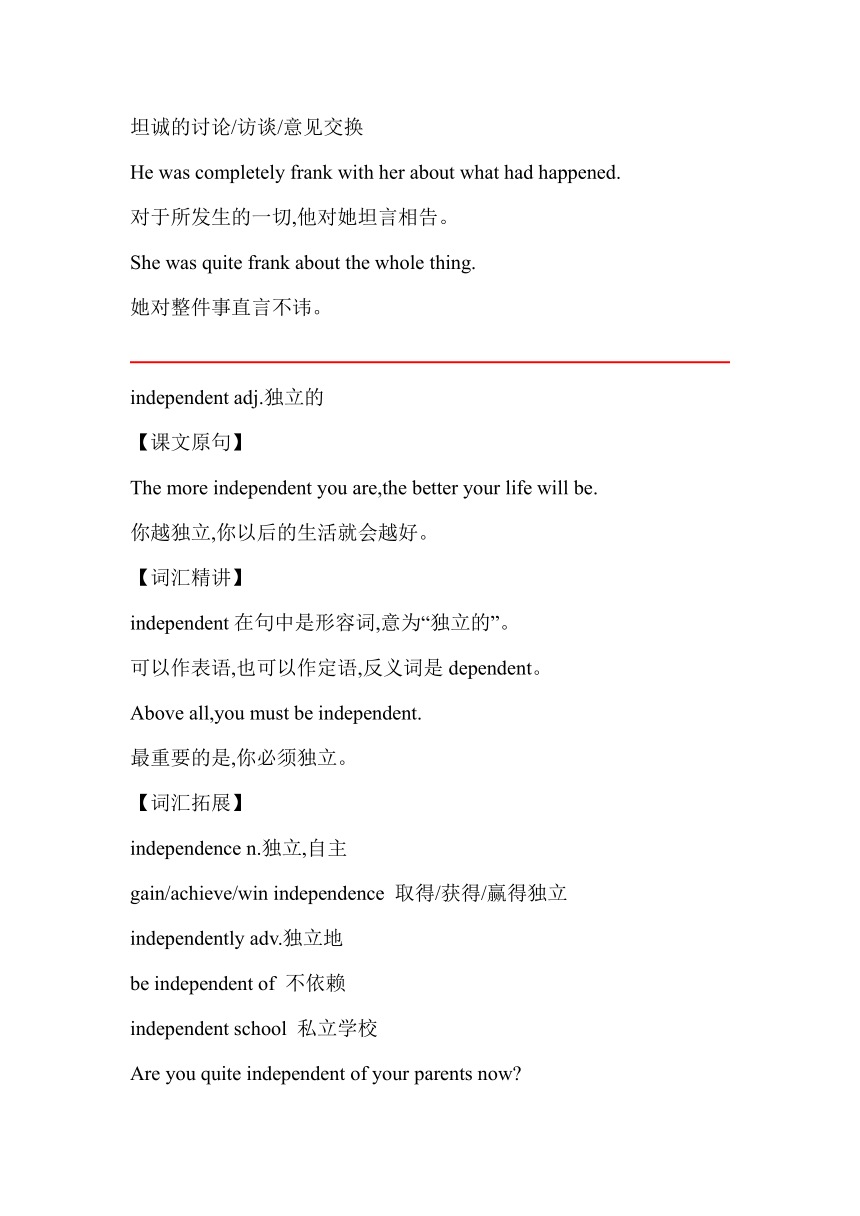
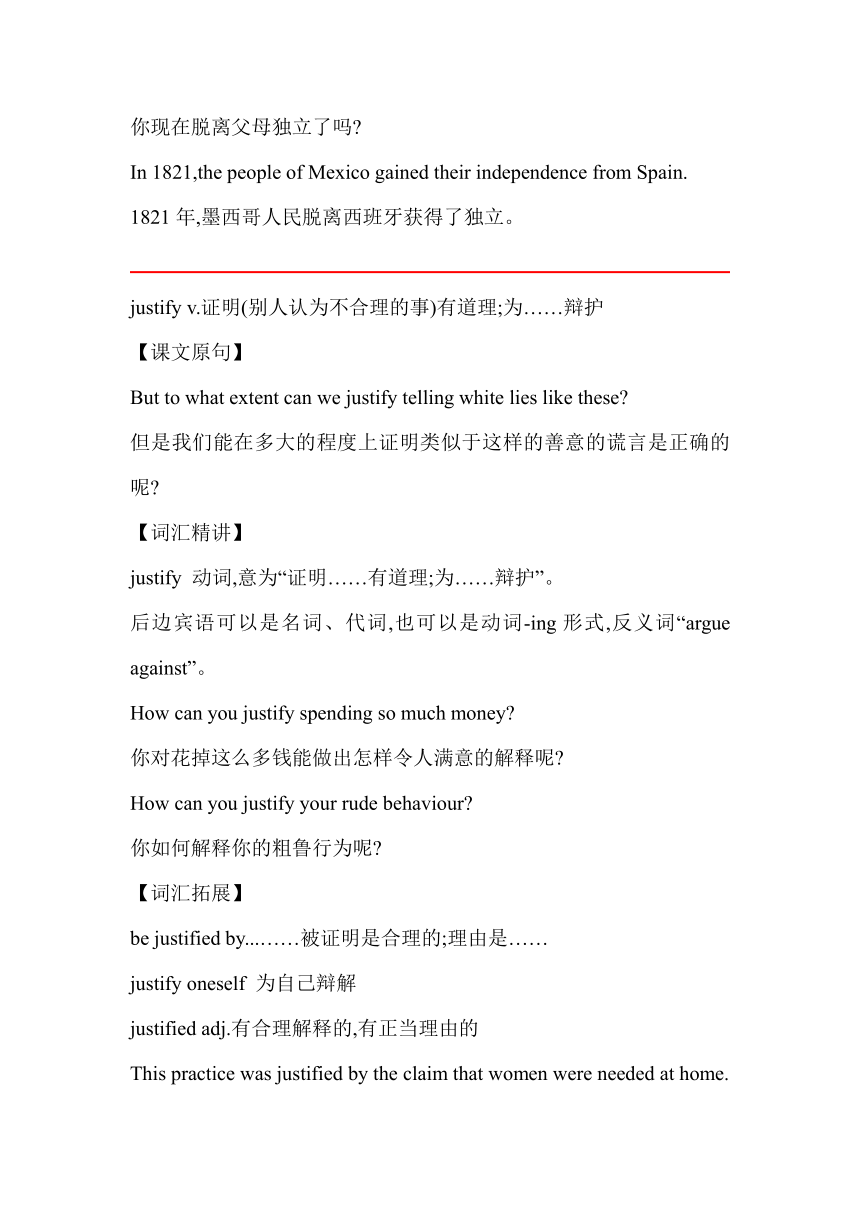
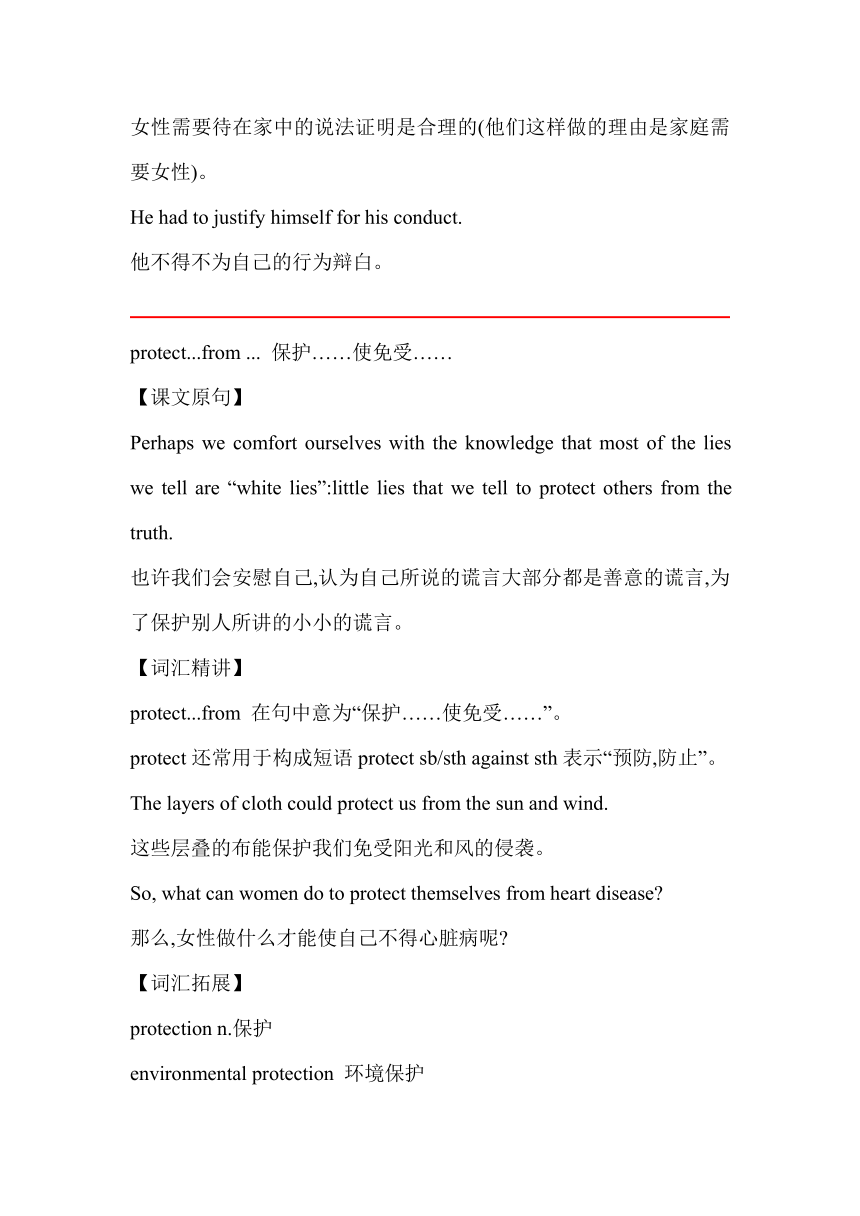
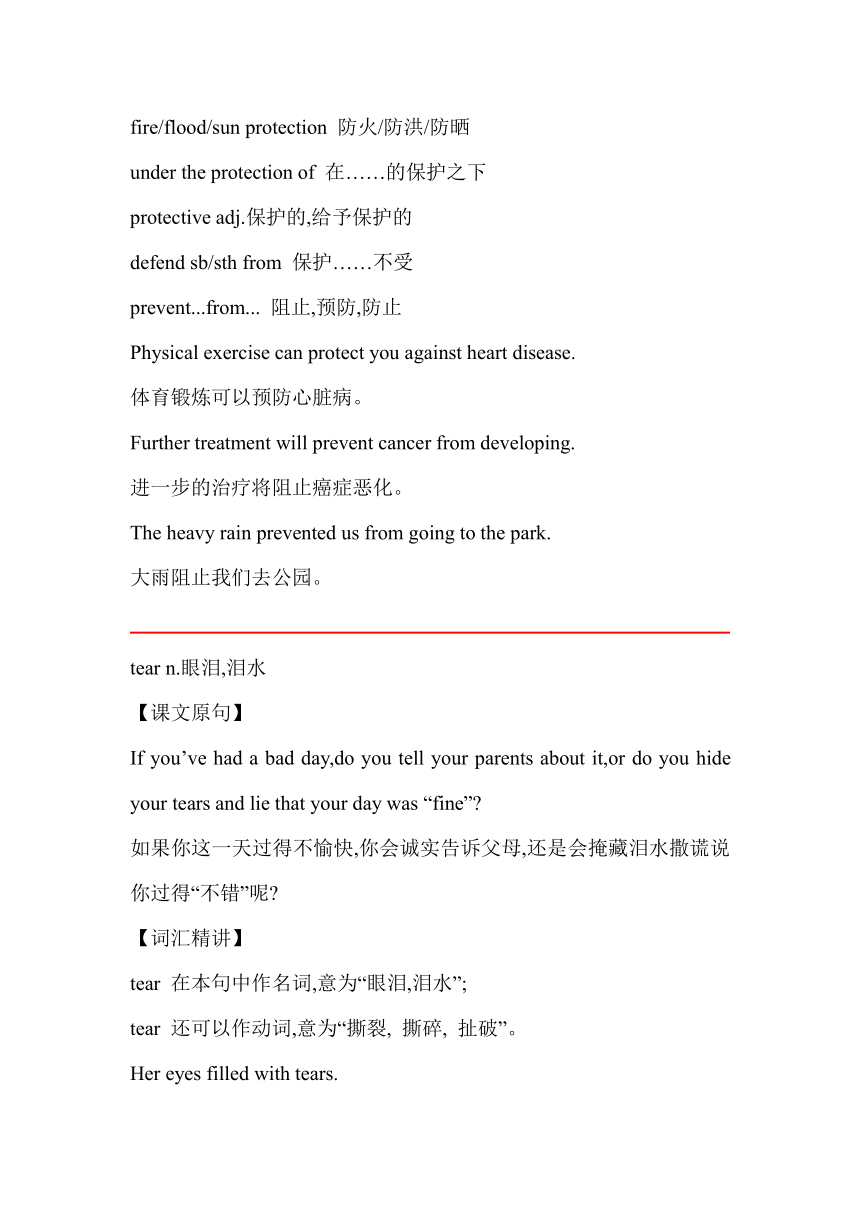
文档简介
Unit 1-Knowing me,knowing you
单元核心考点解析&随堂专练-Section C
【词汇解析】
frank adj.坦率的,坦诚的,直言不讳的
【课文原句】
Stop for a moment and consider that perhaps your friend wants some frank comments from you so that they can improve.
停下来,然后考虑一下,也许你的朋友想从你那里听到坦诚的评论以便提高自我。
【词汇精讲】
frank 形容词,句中意为“坦率的,坦诚的,直言不讳的”。
frank作动词时,意为“在(信封)上盖邮资已付的戳记”。
He was very frank about his relationship with the actress.
他对自己和那位女演员的关系直言不讳。
We have had a frank talk.
我们有过坦率的交谈。
【词汇拓展】
frankly adv.坦白说,坦率地说
to be frank 坦白说,坦率地说
be frank with sb 坦白跟某人讲
be frank about sth 坦率地说
frank discussion/interview/exchange of view
坦诚的讨论/访谈/意见交换
He was completely frank with her about what had happened.
对于所发生的一切,他对她坦言相告。
She was quite frank about the whole thing.
她对整件事直言不讳。
independent adj.独立的
【课文原句】
The more independent you are,the better your life will be.
你越独立,你以后的生活就会越好。
【词汇精讲】
independent在句中是形容词,意为“独立的”。
可以作表语,也可以作定语,反义词是dependent。
Above all,you must be independent.
最重要的是,你必须独立。
【词汇拓展】
independence n.独立,自主
gain/achieve/win independence 取得/获得/赢得独立
independently adv.独立地
be independent of 不依赖
independent school 私立学校
Are you quite independent of your parents now?
你现在脱离父母独立了吗?
In 1821,the people of Mexico gained their independence from Spain.
1821年,墨西哥人民脱离西班牙获得了独立。
justify v.证明(别人认为不合理的事)有道理;为……辩护
【课文原句】
But to what extent can we justify telling white lies like these?
但是我们能在多大的程度上证明类似于这样的善意的谎言是正确的呢?
【词汇精讲】
justify 动词,意为“证明……有道理;为……辩护”。
后边宾语可以是名词、代词,也可以是动词-ing形式,反义词“argue against”。
How can you justify spending so much money?
你对花掉这么多钱能做出怎样令人满意的解释呢?
How can you justify your rude behaviour?
你如何解释你的粗鲁行为呢?
【词汇拓展】
be justified by...……被证明是合理的;理由是……
justify oneself 为自己辩解
justified adj.有合理解释的,有正当理由的
This practice was justified by the claim that women were needed at home.
女性需要待在家中的说法证明是合理的(他们这样做的理由是家庭需要女性)。
He had to justify himself for his conduct.
他不得不为自己的行为辩白。
protect...from ... 保护……使免受……
【课文原句】
Perhaps we comfort ourselves with the knowledge that most of the lies we tell are “white lies”:little lies that we tell to protect others from the truth.
也许我们会安慰自己,认为自己所说的谎言大部分都是善意的谎言,为了保护别人所讲的小小的谎言。
【词汇精讲】
protect...from 在句中意为“保护……使免受……”。
protect还常用于构成短语protect sb/sth against sth表示“预防,防止”。
The layers of cloth could protect us from the sun and wind.
这些层叠的布能保护我们免受阳光和风的侵袭。
So, what can women do to protect themselves from heart disease?
那么,女性做什么才能使自己不得心脏病呢?
【词汇拓展】
protection n.保护
environmental protection 环境保护
fire/flood/sun protection 防火/防洪/防晒
under the protection of 在……的保护之下
protective adj.保护的,给予保护的
defend sb/sth from 保护……不受
prevent...from... 阻止,预防,防止
Physical exercise can protect you against heart disease.
体育锻炼可以预防心脏病。
Further treatment will prevent cancer from developing.
进一步的治疗将阻止癌症恶化。
The heavy rain prevented us from going to the park.
大雨阻止我们去公园。
tear n.眼泪,泪水
【课文原句】
If you’ve had a bad day,do you tell your parents about it,or do you hide your tears and lie that your day was “fine”?
如果你这一天过得不愉快,你会诚实告诉父母,还是会掩藏泪水撒谎说你过得“不错”呢?
【词汇精讲】
tear 在本句中作名词,意为“眼泪,泪水”;
tear 还可以作动词,意为“撕裂, 撕碎, 扯破”。
Her eyes filled with tears.
她双眼噙满泪水。
He was in floods of tears on the phone.
他在电话里失声痛哭。
【词汇拓展】
tearful adj.哭泣的,含泪的,快要哭的
burst into tears 突然哭起来
tear down 扯下;拆毁
tear up 撕碎;拔起
tear...into pieces 把……撕成碎片
tear...open 把……撕开
I don’t know what it was in the novel that made him burst into tears.
我不知道小说中的什么内容让他突然哭起来了。
Tear down the dangerous wall as soon as possible, or sometime it may fall down and injure your family.
尽早拆除这堵危墙,否则不知什么时候它会倒塌弄伤你的家人。
weave v.编,织
【课文原句】
Oh,what a tangled web we weave,When first we practise to deceive!
当我们一旦开始欺骗的时候,我们得编织多么复杂的网啊!
【词汇精讲】
句中weave 是动词,意为“编,织”,过去式wove,过去分词woven。
此外,weave也可以用作名词,意为“编法,织法,编织样式”。
He wove some branches together to form a roof.
他把一些树枝编起来搭成屋顶。
Fabrics with a close weave are ideal for painting.
编织紧密的布最适合作画。
【词汇拓展】
weave your magic 使人入迷
weave in and out 迂回穿行
weave your way through 在……中穿行
weaver 织布工
Only a few women still weave.只有很少的妇女还在编织。
The author wove the incidents together into one story.
作者把那些事件编成一个故事。
The group wove slowly along the narrow dirt track.
这一队人在狭窄的泥土小路上缓慢迂回前进。
【句式解析】
After repeating this process a few times,they eventually found the ideal distance where they could feel warm while managing not to hurt each other.
在重复了这个过程几次之后, 他们最终找到了合适的距离,在这个距离他们既感到温暖,又不会伤到彼此。
【句式剖析】
After repeating... times 是状语,主句是they...distance,在distance 后边的where... each other 是where 引导的定语从句,来修饰distance。
Have you ever had a case where someone accused your journalists of getting the wrong end of the stick?
你有没有遇到这种情况:有人指控你的记者,说他们的报道不实呢?
【句式拓展】
先行词为抽象地点名词的定语从句。
(1)where引导的定语从句可以修饰抽象的地点名词,常见的有system,case,point,stage,occasion,position,situation,condition,activity,race,job,scene,competition等。
Noise is coming to the point where we can’t put up with it.
噪音快到我们无法忍受的地步。
(2)抽象地点名词后的定语从句中如果缺少主语或宾语则需用关系代词that或which。
They have set out to deal with the present situation that deserves their immediate attention.
他们开始处理需要他们立即关注的现状。
The more independent you are,the better your life will be.
你越独立,你的生活就会越好。
【句式剖析】
本句是“the more...the more...”结构,意为“越……,越……”。
表示一方的程度随着另一方的变化而变化,其中的两个the都是副词,而不是冠词。
其中前面的句子是状语从句,后面的句子是主句。
The more he gets,the more he wants.
他得到的越多,他想要的越多。
【句式拓展】
(1)“the more...,the more...”句型,主从句的时态常用一般现在时或一般过去时。
The more you practice,the better you can speak.
你练习越多,你就能说得越好。
(2)若主句的谓语动词用一般将来时,从句的谓语动词要用一般现在时表示将来。
The harder you work,the greater progress you will make.
你越用功,进步就越大。
(3)若比较级作表语且不位于句首时,可以不用the。
When we are more in danger,we should be braver.
越是危险,我们越应勇敢。
(4)在这种句型中,主句在程度上随着从句变化而变化,常把被强调部分提前。
The faster you run,the better it will be.你跑得越快越好。
(5)若表示“越……越不……”时,常用“the more...,the less... ”。
The more she flatters me,the less I like her.
她越逢迎我,我越不喜欢她。
However,when we lie and say that someone’s haircut looks good,or when we say that we love a meal that we secretly hate,are we really hoping to improve the situation for someone else?
然而,当我们撒谎,说某个人的发型看起来很美,或者当我们说我们很喜欢这顿饭但背地里其实很不喜欢的时候,我们真的希望能够让别人改善提高吗?
【句式剖析】
when...or when...引导的时间状语从句,主句的主干是are we really hoping...?
第一个时间状语从句中,we lie and say 后边又跟了一个that引导的宾语从句。
第二个时间状语从句中,say 后边又跟了一个that 引导的宾语从句,而在宾语从句that we love a meal 后是that 引导的定语从句,来修饰a meal。
There are times when I wonder why I do this job.
有时候我也不明白自己为什么要干这个工作。
【句式拓展】
(1)be about to do...when... 正要做某事就……
(2)be doing...when... 正在做某事就在这时……
(3)had just done sth when...刚做完某事就……
【写作指导】
如何写好议论文
一、审题定调
该习作要求反驳对方“家庭作业毫无必要”的观点,是一篇观点论证型议论文。因此写作时首先应该根据提示阐明自己的观点,然后围绕这一观点进行论证,论证过程要做到层次分明、有理有据。人称以第一人称为主,时态以一般现在时为主。
二、谋篇布局
就本篇习作而言,我们可以把全文分为三部分。
第一部分:引出话题,阐明观点(就对方观点提出反对意见);
第二部分:分层论述(家庭作业能够帮助学生复习和预习,培养学生的自学能力,向老师反馈学生对知识的掌握情况);
第三部分:总结全文,重申态度(适量合理的家庭作业对学生的学习有促进作用)。
三、组织语言
就本篇习作而言,每个部分可围绕以下内容组织语言。
1.第一部分:引出话题,阐明观点。
2.第二部分:分层论述。
3.第三部分:总结全文,重申态度。
最近有一名美国留学生在你校英文论坛发帖称,家庭作业不仅占用了他大量的业余时间,而且毫无必要。请你写一篇英语短文回复他的帖子,列举理由(至少三点)来反驳他的观点。
注意:词数100左右。
参考范文:
Hearing your homework takes up too much of your spare time, I feel sympathetic towards you. However, in my opinion, homework is an essential part of learning process.
Firstly, homework ensures review and preview.
In addition, homework is beneficial to the development of self-study abilities.For example, some assignments involve investigating, summarizing, analyzing and evaluating, which are all important skills.
Finally, homework provides feedback for our teachers. If we do a poor job, our teachers will take measures to help us.
In conclusion, proper amounts of homework in proper forms are of great benefit to us.
【随堂专练】
**介词填空
1.The measuring equipment shall be protected damage.?
2.If you require payment,this must be agreed between you and your guest advance.?
3.Some are small,and consist father,mother and a child.?
4.They may apply join the organization.?
5.Don’t be afraid to ask advice about ordering the meal.?
**单句填空
1.Success is (depend) on your efforts and ability.?
2. be honest,I just don’t want to go.?
3.She was so angry that she tore the letter pieces.?
4.She is skilled at spinning and (weave).?
5.They huddled together to protect themselves the wind.?
6.I was about to go out it began to rain.?
7.He got into a situation it is hard to decide what is right and wrong.?
语法填空
Last Tuesday,our class invited 1. old craftsman 2. (teach) us how to make dough figurines(面团雕像).?
When the craftsman came 3. the classroom,we 4. (give) him a warm welcome and two boys helped him with the tool box.First,he showed 5. (we) the basic steps and skills of making dough figurines.We stood around him and watched 6. (attentive).Then we started to have a try ourselves.The old man walked around and helped us patiently.Finally,we put the figurines
7. we made on the table and took pictures with the old craftsman.8. (look) at the figurines,we were all very
9. (excite).?
We hope we can have more 10. (activity) of this kind!?
参考答案:
介词填空:
from;in;of;to;for
语法填空:
答案:dependent
答案:To
答案:into
答案:weaving
答案:from
答案:when
答案:where
语篇语法填空:
an;to teach;into;gave;us;attentively;that/which;looking;excited;activities
单元核心考点解析&随堂专练-Section C
【词汇解析】
frank adj.坦率的,坦诚的,直言不讳的
【课文原句】
Stop for a moment and consider that perhaps your friend wants some frank comments from you so that they can improve.
停下来,然后考虑一下,也许你的朋友想从你那里听到坦诚的评论以便提高自我。
【词汇精讲】
frank 形容词,句中意为“坦率的,坦诚的,直言不讳的”。
frank作动词时,意为“在(信封)上盖邮资已付的戳记”。
He was very frank about his relationship with the actress.
他对自己和那位女演员的关系直言不讳。
We have had a frank talk.
我们有过坦率的交谈。
【词汇拓展】
frankly adv.坦白说,坦率地说
to be frank 坦白说,坦率地说
be frank with sb 坦白跟某人讲
be frank about sth 坦率地说
frank discussion/interview/exchange of view
坦诚的讨论/访谈/意见交换
He was completely frank with her about what had happened.
对于所发生的一切,他对她坦言相告。
She was quite frank about the whole thing.
她对整件事直言不讳。
independent adj.独立的
【课文原句】
The more independent you are,the better your life will be.
你越独立,你以后的生活就会越好。
【词汇精讲】
independent在句中是形容词,意为“独立的”。
可以作表语,也可以作定语,反义词是dependent。
Above all,you must be independent.
最重要的是,你必须独立。
【词汇拓展】
independence n.独立,自主
gain/achieve/win independence 取得/获得/赢得独立
independently adv.独立地
be independent of 不依赖
independent school 私立学校
Are you quite independent of your parents now?
你现在脱离父母独立了吗?
In 1821,the people of Mexico gained their independence from Spain.
1821年,墨西哥人民脱离西班牙获得了独立。
justify v.证明(别人认为不合理的事)有道理;为……辩护
【课文原句】
But to what extent can we justify telling white lies like these?
但是我们能在多大的程度上证明类似于这样的善意的谎言是正确的呢?
【词汇精讲】
justify 动词,意为“证明……有道理;为……辩护”。
后边宾语可以是名词、代词,也可以是动词-ing形式,反义词“argue against”。
How can you justify spending so much money?
你对花掉这么多钱能做出怎样令人满意的解释呢?
How can you justify your rude behaviour?
你如何解释你的粗鲁行为呢?
【词汇拓展】
be justified by...……被证明是合理的;理由是……
justify oneself 为自己辩解
justified adj.有合理解释的,有正当理由的
This practice was justified by the claim that women were needed at home.
女性需要待在家中的说法证明是合理的(他们这样做的理由是家庭需要女性)。
He had to justify himself for his conduct.
他不得不为自己的行为辩白。
protect...from ... 保护……使免受……
【课文原句】
Perhaps we comfort ourselves with the knowledge that most of the lies we tell are “white lies”:little lies that we tell to protect others from the truth.
也许我们会安慰自己,认为自己所说的谎言大部分都是善意的谎言,为了保护别人所讲的小小的谎言。
【词汇精讲】
protect...from 在句中意为“保护……使免受……”。
protect还常用于构成短语protect sb/sth against sth表示“预防,防止”。
The layers of cloth could protect us from the sun and wind.
这些层叠的布能保护我们免受阳光和风的侵袭。
So, what can women do to protect themselves from heart disease?
那么,女性做什么才能使自己不得心脏病呢?
【词汇拓展】
protection n.保护
environmental protection 环境保护
fire/flood/sun protection 防火/防洪/防晒
under the protection of 在……的保护之下
protective adj.保护的,给予保护的
defend sb/sth from 保护……不受
prevent...from... 阻止,预防,防止
Physical exercise can protect you against heart disease.
体育锻炼可以预防心脏病。
Further treatment will prevent cancer from developing.
进一步的治疗将阻止癌症恶化。
The heavy rain prevented us from going to the park.
大雨阻止我们去公园。
tear n.眼泪,泪水
【课文原句】
If you’ve had a bad day,do you tell your parents about it,or do you hide your tears and lie that your day was “fine”?
如果你这一天过得不愉快,你会诚实告诉父母,还是会掩藏泪水撒谎说你过得“不错”呢?
【词汇精讲】
tear 在本句中作名词,意为“眼泪,泪水”;
tear 还可以作动词,意为“撕裂, 撕碎, 扯破”。
Her eyes filled with tears.
她双眼噙满泪水。
He was in floods of tears on the phone.
他在电话里失声痛哭。
【词汇拓展】
tearful adj.哭泣的,含泪的,快要哭的
burst into tears 突然哭起来
tear down 扯下;拆毁
tear up 撕碎;拔起
tear...into pieces 把……撕成碎片
tear...open 把……撕开
I don’t know what it was in the novel that made him burst into tears.
我不知道小说中的什么内容让他突然哭起来了。
Tear down the dangerous wall as soon as possible, or sometime it may fall down and injure your family.
尽早拆除这堵危墙,否则不知什么时候它会倒塌弄伤你的家人。
weave v.编,织
【课文原句】
Oh,what a tangled web we weave,When first we practise to deceive!
当我们一旦开始欺骗的时候,我们得编织多么复杂的网啊!
【词汇精讲】
句中weave 是动词,意为“编,织”,过去式wove,过去分词woven。
此外,weave也可以用作名词,意为“编法,织法,编织样式”。
He wove some branches together to form a roof.
他把一些树枝编起来搭成屋顶。
Fabrics with a close weave are ideal for painting.
编织紧密的布最适合作画。
【词汇拓展】
weave your magic 使人入迷
weave in and out 迂回穿行
weave your way through 在……中穿行
weaver 织布工
Only a few women still weave.只有很少的妇女还在编织。
The author wove the incidents together into one story.
作者把那些事件编成一个故事。
The group wove slowly along the narrow dirt track.
这一队人在狭窄的泥土小路上缓慢迂回前进。
【句式解析】
After repeating this process a few times,they eventually found the ideal distance where they could feel warm while managing not to hurt each other.
在重复了这个过程几次之后, 他们最终找到了合适的距离,在这个距离他们既感到温暖,又不会伤到彼此。
【句式剖析】
After repeating... times 是状语,主句是they...distance,在distance 后边的where... each other 是where 引导的定语从句,来修饰distance。
Have you ever had a case where someone accused your journalists of getting the wrong end of the stick?
你有没有遇到这种情况:有人指控你的记者,说他们的报道不实呢?
【句式拓展】
先行词为抽象地点名词的定语从句。
(1)where引导的定语从句可以修饰抽象的地点名词,常见的有system,case,point,stage,occasion,position,situation,condition,activity,race,job,scene,competition等。
Noise is coming to the point where we can’t put up with it.
噪音快到我们无法忍受的地步。
(2)抽象地点名词后的定语从句中如果缺少主语或宾语则需用关系代词that或which。
They have set out to deal with the present situation that deserves their immediate attention.
他们开始处理需要他们立即关注的现状。
The more independent you are,the better your life will be.
你越独立,你的生活就会越好。
【句式剖析】
本句是“the more...the more...”结构,意为“越……,越……”。
表示一方的程度随着另一方的变化而变化,其中的两个the都是副词,而不是冠词。
其中前面的句子是状语从句,后面的句子是主句。
The more he gets,the more he wants.
他得到的越多,他想要的越多。
【句式拓展】
(1)“the more...,the more...”句型,主从句的时态常用一般现在时或一般过去时。
The more you practice,the better you can speak.
你练习越多,你就能说得越好。
(2)若主句的谓语动词用一般将来时,从句的谓语动词要用一般现在时表示将来。
The harder you work,the greater progress you will make.
你越用功,进步就越大。
(3)若比较级作表语且不位于句首时,可以不用the。
When we are more in danger,we should be braver.
越是危险,我们越应勇敢。
(4)在这种句型中,主句在程度上随着从句变化而变化,常把被强调部分提前。
The faster you run,the better it will be.你跑得越快越好。
(5)若表示“越……越不……”时,常用“the more...,the less... ”。
The more she flatters me,the less I like her.
她越逢迎我,我越不喜欢她。
However,when we lie and say that someone’s haircut looks good,or when we say that we love a meal that we secretly hate,are we really hoping to improve the situation for someone else?
然而,当我们撒谎,说某个人的发型看起来很美,或者当我们说我们很喜欢这顿饭但背地里其实很不喜欢的时候,我们真的希望能够让别人改善提高吗?
【句式剖析】
when...or when...引导的时间状语从句,主句的主干是are we really hoping...?
第一个时间状语从句中,we lie and say 后边又跟了一个that引导的宾语从句。
第二个时间状语从句中,say 后边又跟了一个that 引导的宾语从句,而在宾语从句that we love a meal 后是that 引导的定语从句,来修饰a meal。
There are times when I wonder why I do this job.
有时候我也不明白自己为什么要干这个工作。
【句式拓展】
(1)be about to do...when... 正要做某事就……
(2)be doing...when... 正在做某事就在这时……
(3)had just done sth when...刚做完某事就……
【写作指导】
如何写好议论文
一、审题定调
该习作要求反驳对方“家庭作业毫无必要”的观点,是一篇观点论证型议论文。因此写作时首先应该根据提示阐明自己的观点,然后围绕这一观点进行论证,论证过程要做到层次分明、有理有据。人称以第一人称为主,时态以一般现在时为主。
二、谋篇布局
就本篇习作而言,我们可以把全文分为三部分。
第一部分:引出话题,阐明观点(就对方观点提出反对意见);
第二部分:分层论述(家庭作业能够帮助学生复习和预习,培养学生的自学能力,向老师反馈学生对知识的掌握情况);
第三部分:总结全文,重申态度(适量合理的家庭作业对学生的学习有促进作用)。
三、组织语言
就本篇习作而言,每个部分可围绕以下内容组织语言。
1.第一部分:引出话题,阐明观点。
2.第二部分:分层论述。
3.第三部分:总结全文,重申态度。
最近有一名美国留学生在你校英文论坛发帖称,家庭作业不仅占用了他大量的业余时间,而且毫无必要。请你写一篇英语短文回复他的帖子,列举理由(至少三点)来反驳他的观点。
注意:词数100左右。
参考范文:
Hearing your homework takes up too much of your spare time, I feel sympathetic towards you. However, in my opinion, homework is an essential part of learning process.
Firstly, homework ensures review and preview.
In addition, homework is beneficial to the development of self-study abilities.For example, some assignments involve investigating, summarizing, analyzing and evaluating, which are all important skills.
Finally, homework provides feedback for our teachers. If we do a poor job, our teachers will take measures to help us.
In conclusion, proper amounts of homework in proper forms are of great benefit to us.
【随堂专练】
**介词填空
1.The measuring equipment shall be protected damage.?
2.If you require payment,this must be agreed between you and your guest advance.?
3.Some are small,and consist father,mother and a child.?
4.They may apply join the organization.?
5.Don’t be afraid to ask advice about ordering the meal.?
**单句填空
1.Success is (depend) on your efforts and ability.?
2. be honest,I just don’t want to go.?
3.She was so angry that she tore the letter pieces.?
4.She is skilled at spinning and (weave).?
5.They huddled together to protect themselves the wind.?
6.I was about to go out it began to rain.?
7.He got into a situation it is hard to decide what is right and wrong.?
语法填空
Last Tuesday,our class invited 1. old craftsman 2. (teach) us how to make dough figurines(面团雕像).?
When the craftsman came 3. the classroom,we 4. (give) him a warm welcome and two boys helped him with the tool box.First,he showed 5. (we) the basic steps and skills of making dough figurines.We stood around him and watched 6. (attentive).Then we started to have a try ourselves.The old man walked around and helped us patiently.Finally,we put the figurines
7. we made on the table and took pictures with the old craftsman.8. (look) at the figurines,we were all very
9. (excite).?
We hope we can have more 10. (activity) of this kind!?
参考答案:
介词填空:
from;in;of;to;for
语法填空:
答案:dependent
答案:To
答案:into
答案:weaving
答案:from
答案:when
答案:where
语篇语法填空:
an;to teach;into;gave;us;attentively;that/which;looking;excited;activities
